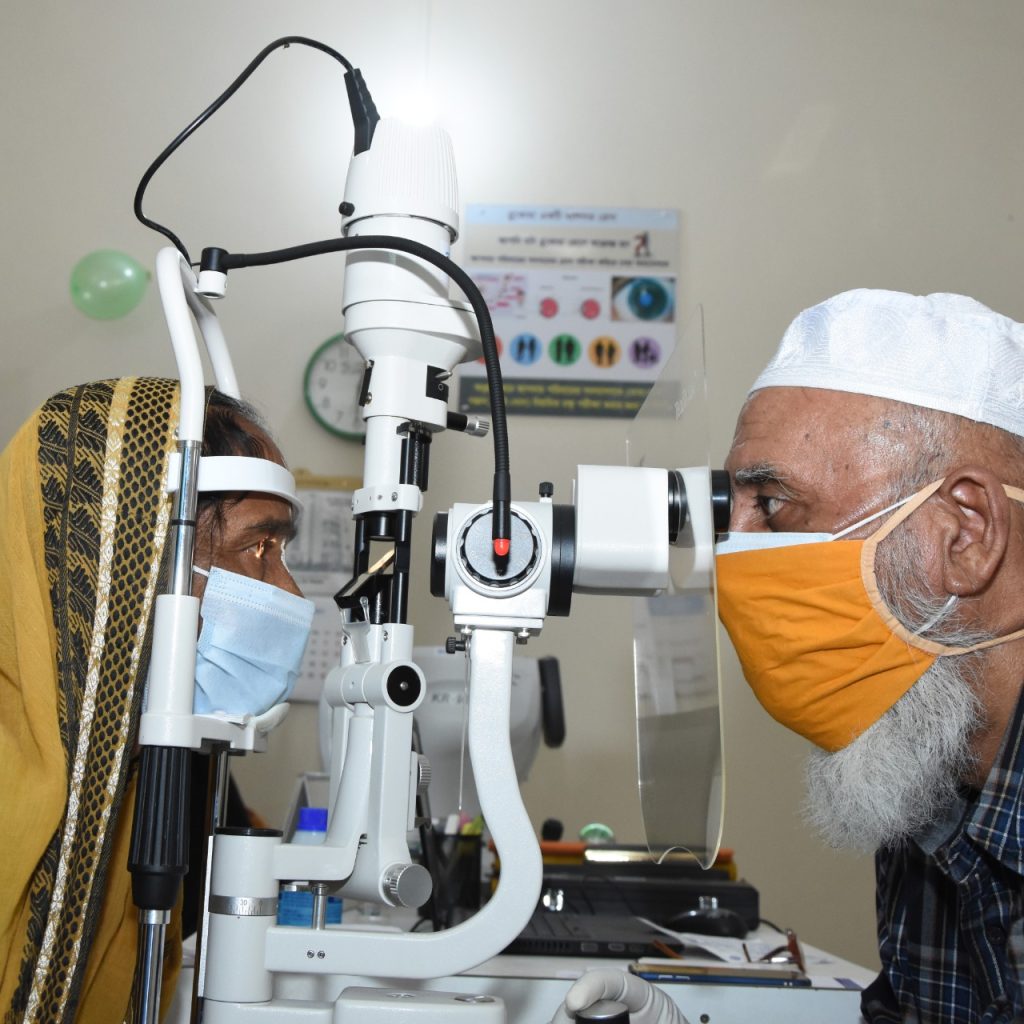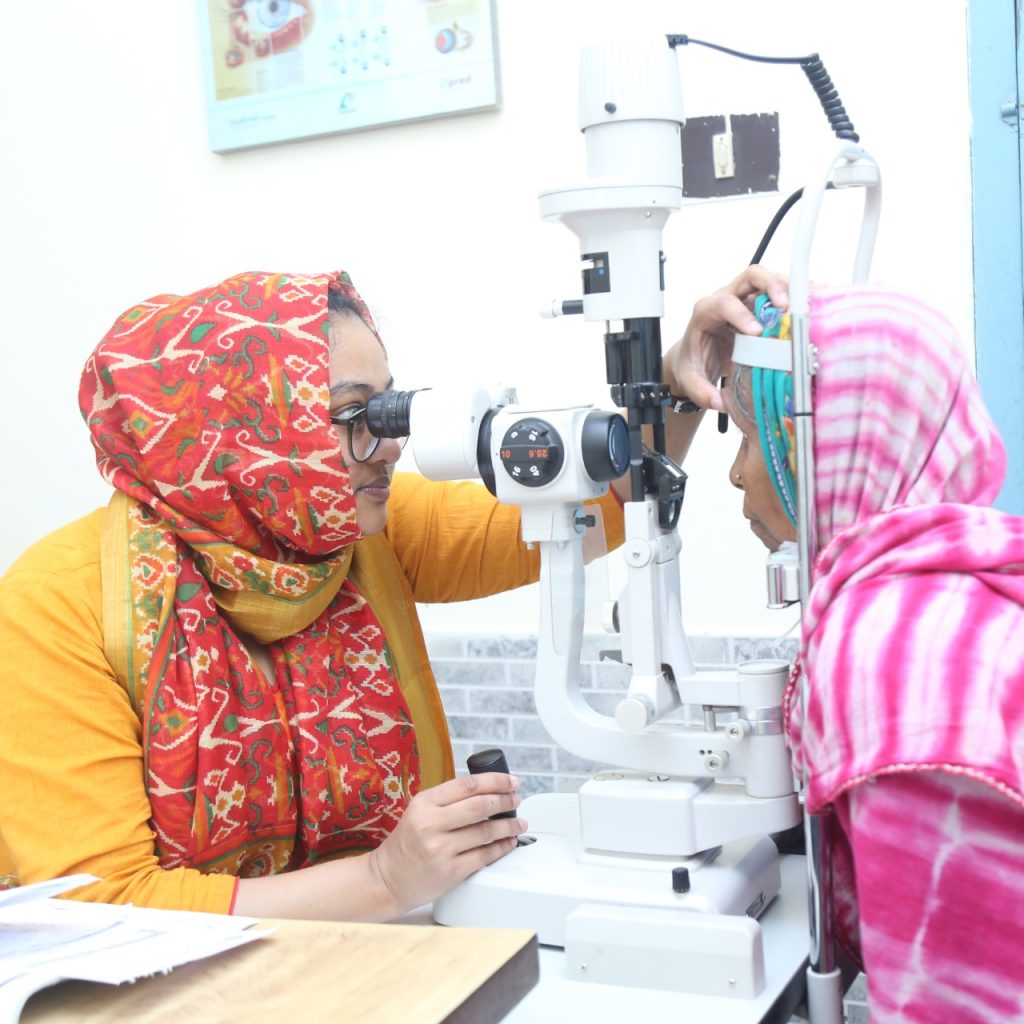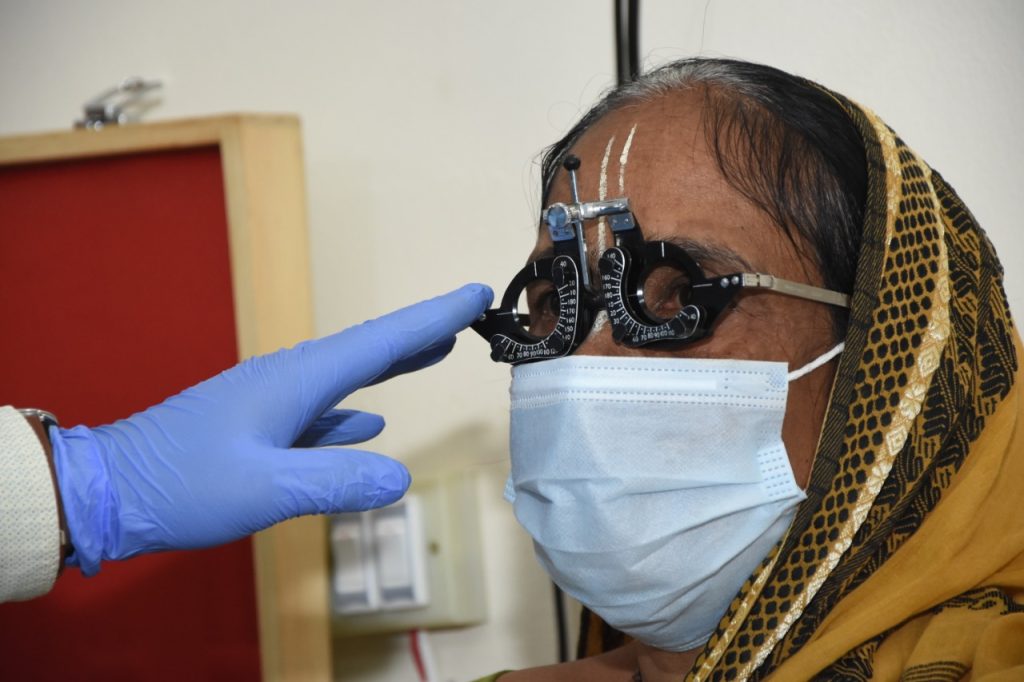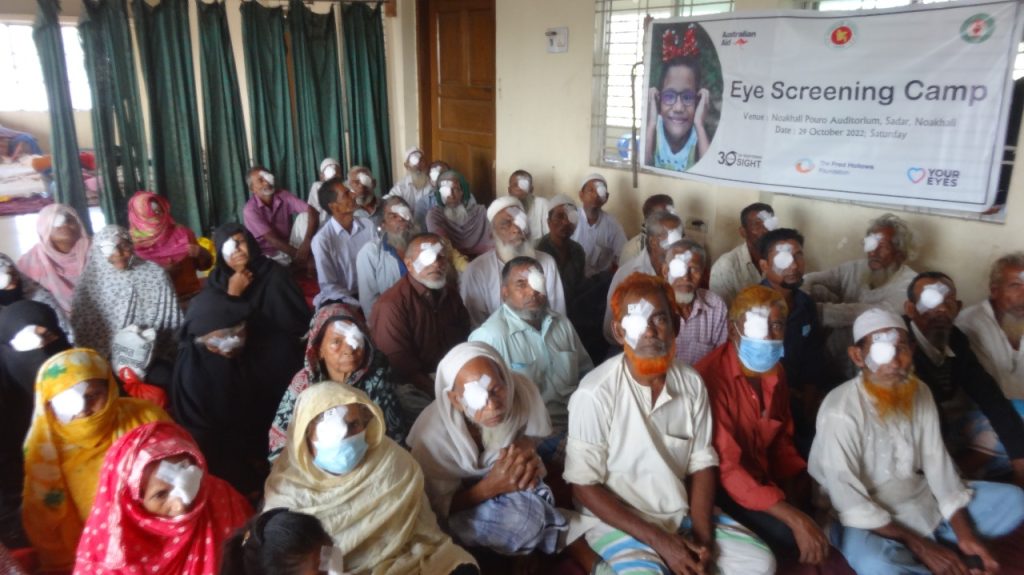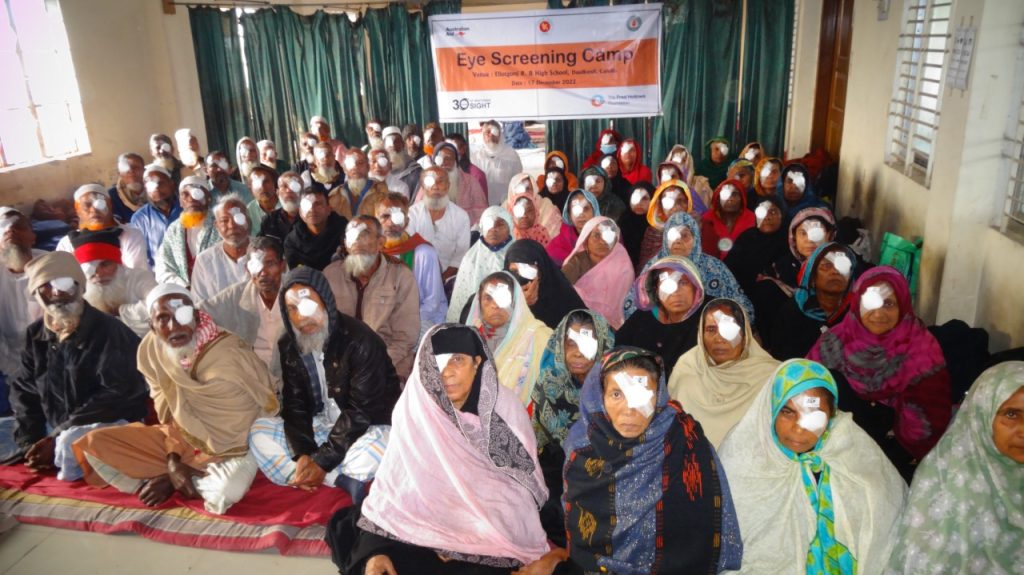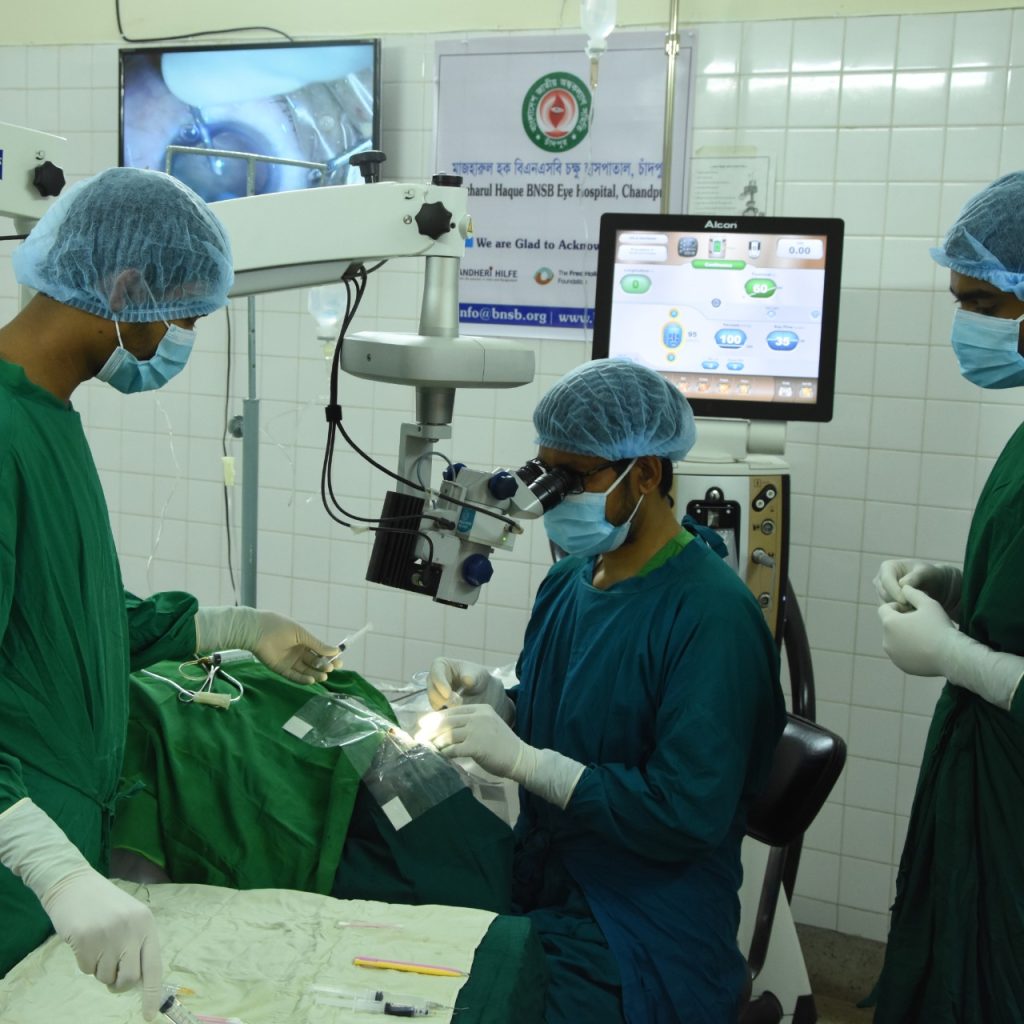
Cataract Unit
Cataract is the leading cause of curable blindness particularly in the ageing population. The patients can be visually rehabilitated satisfactorily through intraocular lens (IOL) implantation after removal of cataractous lens. The hospital performs around 12000 cataract surgeries annually. Small incision cataract surgeries both manual and by phacoemulsification technique are done routinely. One stop service is offered to cataract patients where evaluation, counseling and appointment for surgery are done in a dedicated area. Most of the surgeries are done in Impatient Department and sometimes on day care basis.
Best Quality eye care services at affordable cost. Cataract surgery (SICS, Phaco) are very much important to restore sight instantly of a blind people caused by Cataract.
Cataract Surgery Statistics
Surgery Performed in last 05 years 43,369
Total Cataract Surgery Performed in Hospital IPD Department 90,624 ++
In Last 05 Years Total Cataract Surgery Performed in Hospital IPD Department 43,369
Overview of Cataract
About Cataract:
In a healthy eye, light enters the eye and passes through a clear lens. In cataract, the lens becomes cloudy and blocks light from passing through. This causes blurred vision.
Causes & Risk Factors:
Cataracts are caused by changes in the lens of the eye. A few things can increase your risk of cataract. These include:
- Increased Age
- Eye diseases like glaucoma, diabetes, and eye tumors
- Prolonged Use of steroid drugs
- Eye injuries
- Direct exposure to sunlight
As you get older, your eyes start to age and may form cataracts. This is very common. While people above the age of 45 are at a greater risk, cataract can sometimes occur in children. Luckily, both adult and childhood cataracts can be treated.
Key Points to Remember:
- Cataract is not contagious.
- It is very common in older adults.
- Surgery is the only effective cure and is very safe.
Treatment of Cataract
Cataracts are treated through a safe, effective surgery. Your doctor will remove your cloudy opaque lens and replace it with an artificial lens. This lens is called an “Intraocular Lens”, or an IOL. Since light can pass through this new lens, clear vision is restored. Unlike contact lenses, the IOL stays in your eye forever. There are many types of IOLs. Doctors and counsellors can help you choose the best lens for you.
In adults, surgery is done under local anesthesia. You will be awake, but you will not feel any pain. Depending on your condition, your doctor may do the surgery with a machine or manually. The machine surgery is called phacoemulsification or “PHACO” and the other one is called Manual Small Incision Cataract Surgery (MSICS). Both surgeries are common. Your doctor will choose the safest option for your eyes.
- Faster healing because the incision is so small
- Less likely to need stitches or sutures
- Fewer follow-up visits
- Stable vision within 1 month of surgery
- Patients can read or watch TV after 1 week
Complications are very rare and most can be treated. They usually occur when a patient has another eye disease that interferes with vision. If you have another eye condition, your consulting doctor may want to treat it before the cataract surgery.
Risks include:
- Inflammation
- Infection
- Bleeding
- Swelling
- Secondary cataract
- Vision loss
You will likely need to take eye drops on the day before surgery, the day of surgery, and just after surgery. An eye doctor or counsellor will provide you with specific instructions as to when to apply the drops. Please inform the doctor if you are allergic to any medications.
Do not use any other medicines on your eyes. Follow the doctor or counsellor’s instructions carefully. For quick healing without any complications, you must take your medicines as advised.
After the surgery, your vision should slowly get better. At first, your vision may be blurred. Your eyes may be itchy, watery, or slightly red for a few days. This is a normal part of healing. With proper care, your eyes should heal completely within 8 weeks.
Once you return home, you will need to take the following precautions:
- Remove the eye bandage and wear dark glasses
- Wash hands with soap before applying eye drops
- Clean the eyes once a day with a sterile cotton ball. To sterilize the cotton, dip it in boiling water and wait until it cools to room temperature.
- Wear dark glasses when traveling
Follow the medication chart closely
- Avoid sunlight, smoke, and dust
- Avoid tobacco, smoking, and alcohol
- Patients with glaucoma will need to take their glaucoma medicines regularly
- Patients with diabetes or hypertension should monitor their blood sugar, blood pressure, and cholesterol levels
- Avoid using the TV, computer, or smart phone. If you feel any eye pain, stop using electronics entirely.
- Do NOT remove the eye shield, bandage, or patch for 1 day.
- Do NOT go to sleep while wearing your glasses for 3 days.
- Do NOT sleep on the side of the face with the operated eye for 3 days.
- Do NOT shave for 1 week.
- Avoid playing with children or pets for 1 week.
- Do NOT get water on face, shower, wash hair, or use facial cosmetics for 1 week.
- Do NOT wipe near the eye with anything other than a sterile tissue/cotton ball for 1 week.
- Do NOT go outside without wearing the dark sunglasses for 10 days.
- Avoid cooking foods that create smoke or steam for 10 days.
- Do NOT do anything that creates “pressure” on the body, such as lifting heavy weights or strenuous exercise for 15 days.
- Do NOT ride a two-wheeler without protective glasses for 15 days.
- Do NOT let dust or smoke get into the eye for 15 days.
- Resume all normal daily activities after 15 days.
If you have severe eye pain, redness, or vision loss, please visit an eye hospital immediately.
For Accessible, Affordable and Quality Eye Care Service please contact with us. You can also support our project and activities for the most vulnerable community of Bangladesh.
Symptoms of Cataract


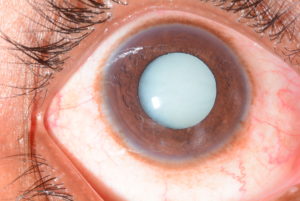

Photo Gallery
